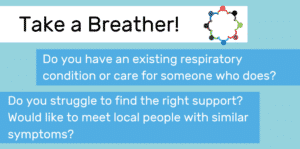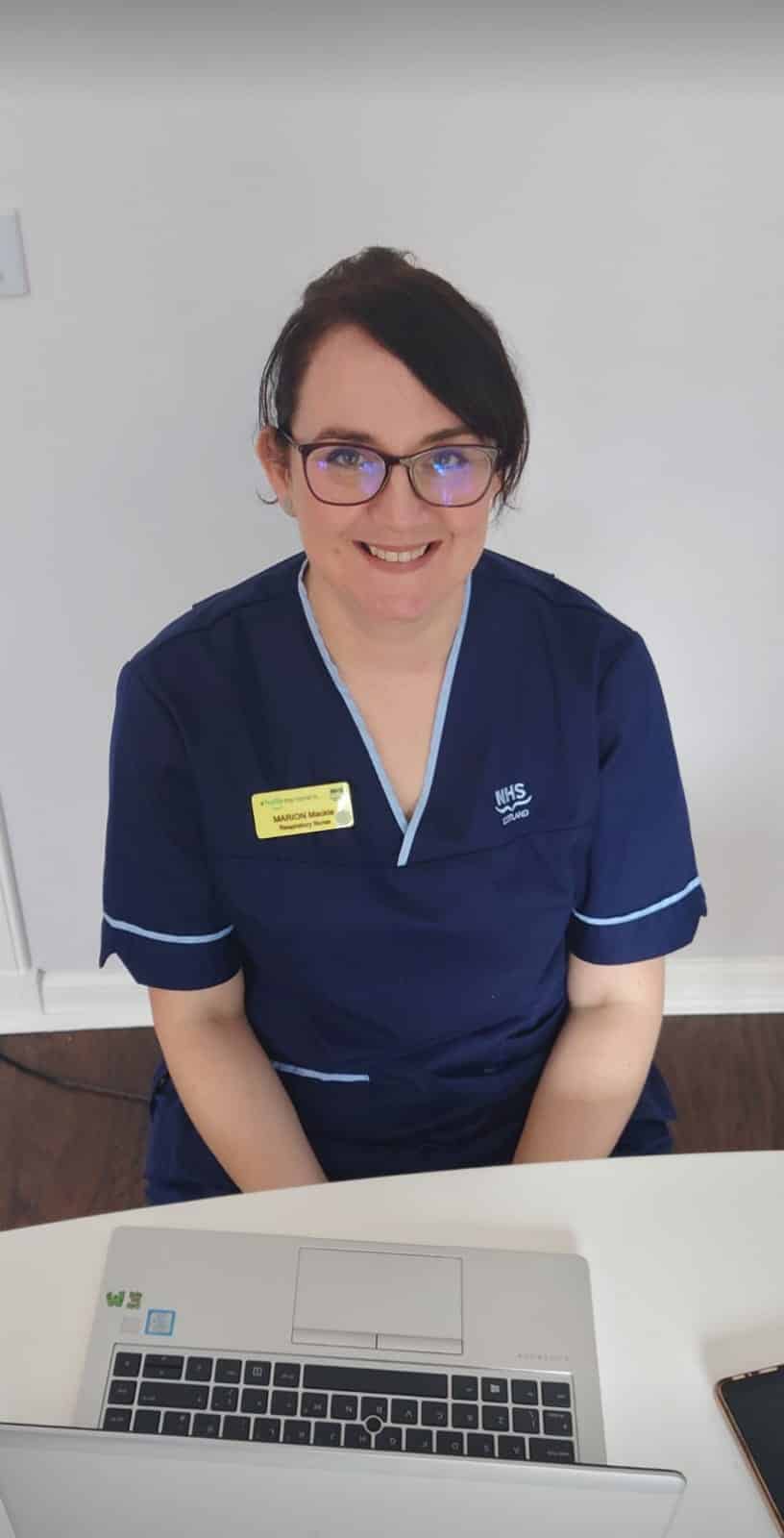Marion Mackie is a Respiratory Nurse Specialist based at Renfrew Health and Social Care Centre. She cares for patients within Renfrewshire HSCP/GG&C and works within the Rehabilitation and Enablement Service (RES), acting as an advocate for respiratory patients.
In my day to day job I work as an advocate for respiratory patients, liaising with General Practitioners (GPS), Advanced Nurse Practitioners (ANPS), Respiratory Consultants and Respiratory Clinical Nurse Specialist teams based at the Royal Alexandra Hospital, Queen Elizabeth University Hospital and the wider MDT within Renfrewshire HSCP. My journey with QNIS started back in October 2019 with my involvement as a Catalysts for Change project leader.

Our project, based at Renfrewshire HSCP/GG&C within the Ferguslie Park area of Paisley, was to set up a respiratory support group called ‘Take a Breather’. Unfortunately, despite establishing this project in late 2019 it had to be paused in March 2020 due to the pandemic. We are currently working on establishing a virtual support group for all our respiratory patients. Now more than ever those with a respiratory condition are looking for help from community support networks. It was during a recent Microsoft Teams meeting that I was first asked to consider my professional experience of COVID-19, a story I’m now sharing with you.
There has never been a more challenging time for any healthcare professional, especially for the Respiratory Nurse Specialists, Respiratory Consultants and Allied Health Care professionals working within the respiratory profession.
Our journey began back in early February. My colleagues and I watched in disbelief as COVID-19 took hold in China, back then it seemed like worlds away from us in Scotland. This set alarm bells ringing in the heads of all respiratory professionals. What would happen if this spread? How could we best protect, manage and care for our respiratory patients in both acute and primary care settings? Initially, the biggest challenge was encouraging people to acknowledge the potential pressure this would put on our communities. Nobody wants to consider the worst-case scenario but in respiratory nursing, it was essential for us to take rapid, preparatory action considering what difficulties might lie ahead.
Under the direction of Dr Anderson, a respiratory consultant based at Queen Elizabeth University Hospital (QEUH) our team was invited to attend an emergency respiratory meeting to develop a plan for managing a potential COVID-19 outbreak.

The service took a board-wide approach from the very start, enabling collaborative and integrated working between Renfrewshire HSCP Rehabilitation and Enablement Service (RES), Glasgow HSCP Community Respiratory Team (CRT), Respiratory Clinical Nurse Specialists and Respiratory Consultants within acute care based at (Royal Alexandra Hospital, Inverclyde Royal Hospital, Queen Elizabeth University Hospitals and Glasgow Royal Infirmary) Through prompt and successful integrated working the GG&C Community Respiratory Response team (CRRT) was developed and set up within a matter of weeks as a 7-day service across GG&C, when it was initially established.
This proactive approach was designed to help prevent GG&C from being in a similar situation as seen in other communities across the globe. Initially, we were preparing for the worst-case scenario, which thankfully was avoided. The main objective was to treat and care for respiratory patients in their home setting with a possible or confirmed diagnosis of COVID-19. We also worked closely with GP and COVID-19 Community Assessment Centres, facilitating admission avoidance, supporting hospital discharges and management of acute and chronic respiratory disease. We managed to shield patients with remote and telehealth consultations where appropriate. For others, we would provide home visits when required. Using PPE allowed us to minimise risk to patients and staff.
The main impact of the CRRT was on hospital capacity, freeing up beds in acute care. The CRRT started in March 2020 and, to date, has received 2,500 referrals. This has provided patients with Chronic Respiratory Disease a safe alternative to hospital admission. Hospital attendees with COPD have been proportionally lower in GG&C since the CRRT was introduced. The benefits are twofold. The patient’s, safe and supported management at home minimises their chance of contracting the virus in a hospital setting and is preferable to most of our patient group. For the hospital and primary care settings knowing that the population is being safely managed released capacity for them to focus on managing COVID related pneumonia patients.
We owe a great deal of gratitude to all the respiratory MDT, not only for their hard work in the fight against COVID-19 but also for their dedication to prevention early on.

Stewart Cameron, Support Group Member
The respiratory MDT and our physiotherapist colleagues continue to work tirelessly, caring for not only our respiratory patients in the community but also within hospitals. They are a driving force in managing post-COVID rehabilitation and general support for those who have become deconditioned over the lockdown period. Our physiotherapist and allied health care professional colleagues continue to work tirelessly managing ongoing rehabilitation. In my experience at it has been a pleasure and honour to see how dedicated they are to their work and the lengths they are willing to go to help rehabilitate all patients in need.
Setting up the CRRT has been a great success and through integrated working, we have managed to shield the most vulnerable respiratory patients during this pandemic. It has not been easy and the hard work and dedication behind the scenes have been huge. It is through the goodwill of those involved and their ambitions to protect their patients that this has been a success. It has also been extremely rewarding for all involved. Although an emotional and exhausting few months the CRRT ultimately achieved our goal of shielding most respiratory patients, facilitating safe hospital discharges and preventing increased hospital admissions. As we ease out of lockdown we continue to work in a similar fashion but on a smaller scale. We shall continue to minimise the risk for this very vulnerable group with the use of telehealth and remote consultations.
Should there be subsequent waves of COVID-19 we already have an established team and support network in place. I think our journey throughout the pandemic is a success story and shows the benefits of integrated working between the community and hospital teams. By evidencing the good aspects of our team working I am hopeful we can build on this model for future collaborative projects.
Marion would like to thank her wonderful colleagues.
At RES: Rehabilitation Nurse Diane Brown, Rehabilitation Physiotherapists Carolyn Birch, David Boyle, Fiona Salisbury, Deborah McCusker, Nina McFarlane and Nikhil Gupta.
I feel they all deserve a special mention as they had minimal respiratory experience and their goodwill, willingness to learn and ability to adapt quickly under difficult circumstances was the main reason our team at RES worked so effectively.
To the Renfrewshire HSCP senior management team: Fiona Ralph, Pauline Robbie, Angela Riddle, Karen Jarvis, Fiona Hunter and Laura Glennon.
Having a supportive team has been invaluable to me on both a professional and personal level and for this I am extremely grateful.
To her fellow Respiratory Clinical Nurse Specialists and AHP at the RAH, IRH, QEUH and GRI.
Thank you for your ongoing support, this help has been invaluable to our team in Renfrewshire.
To the GG&C Community Respiratory Team and Pulmonary Rehabilitation MDT and Respiratory Physiotherapists.
You have helped to provide development and education for our Rehabilitation Physiotherapist around respiratory care in a very short period of time.
Lastly, a big thanks to all the Respiratory Consultants who have been involved for their ongoing medical support and their advice in the community.